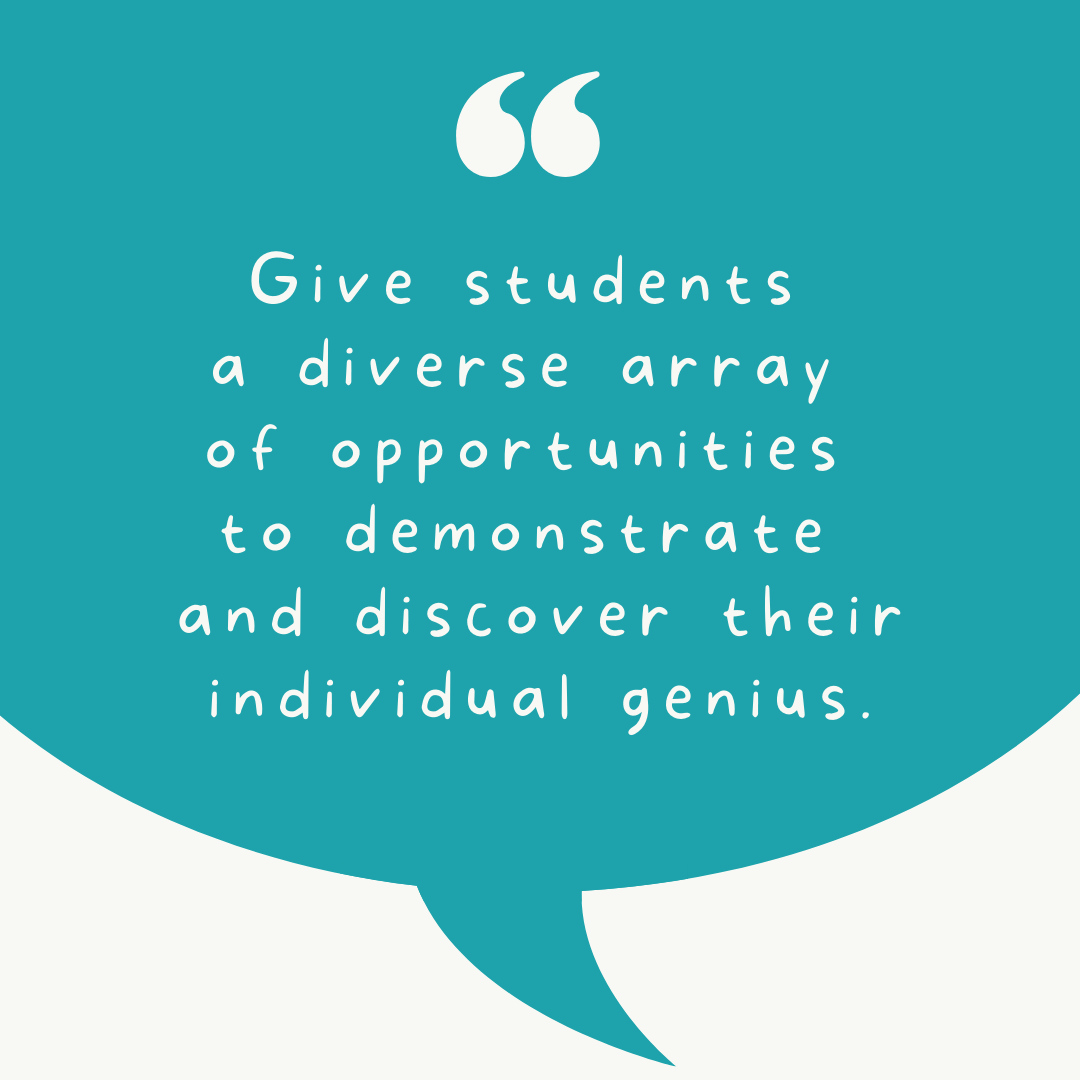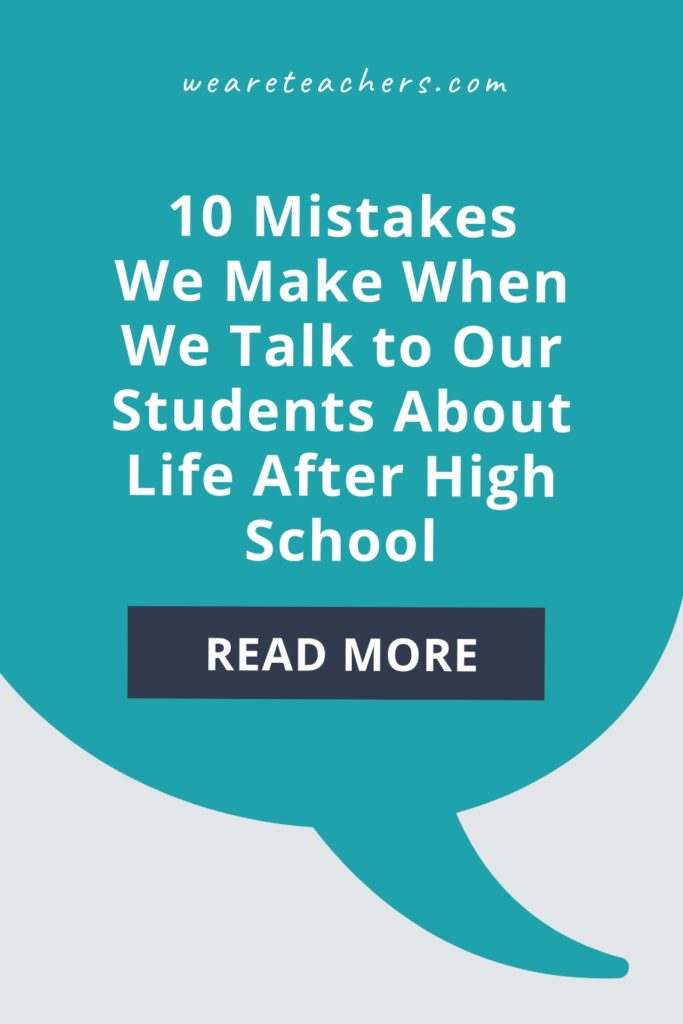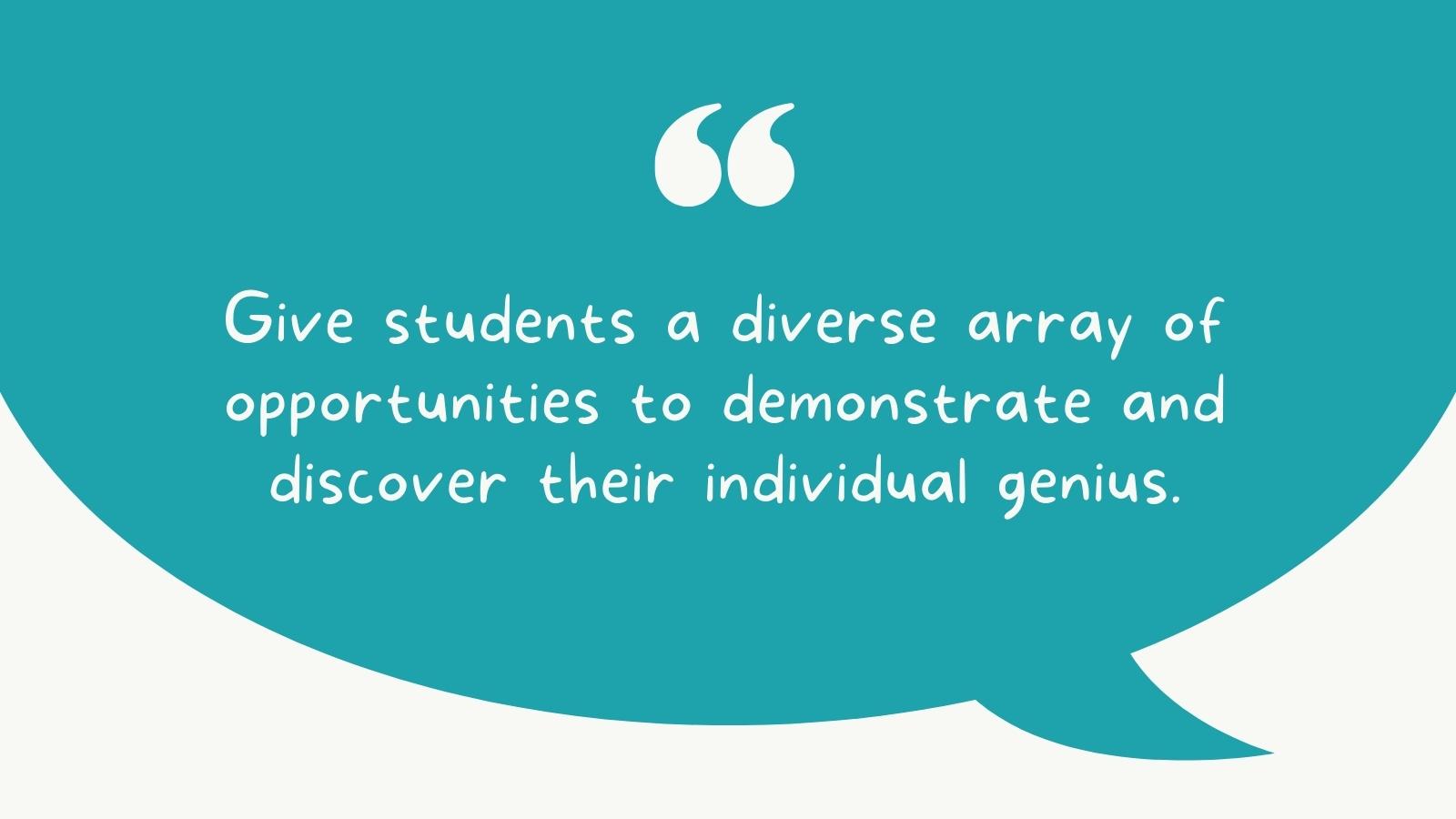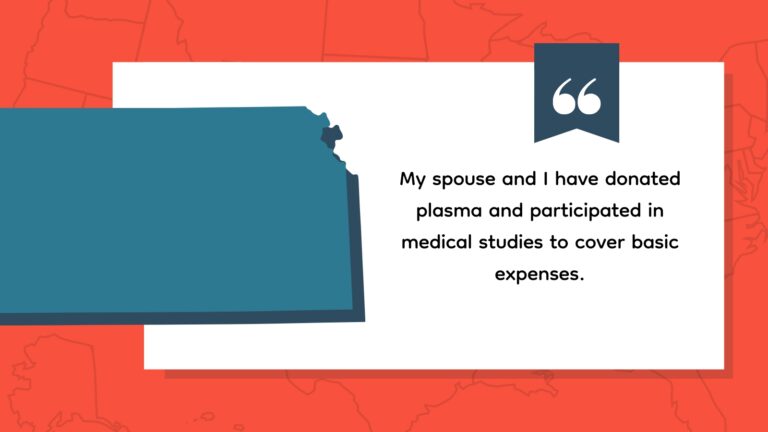Talking to teens about life after high school can be tricky. We want to motivate them without placing too much pressure on them, encourage them to dream big while reminding them to be realistic and consider all their options. It can feel like a bit of a tightrope act. But easy or not, one thing’s for sure: The way we communicate with teens about life after high school can shape their entire journey. Here’s a look at 10 things we often get wrong when we prepare students for post-secondary life and simple but game-changing shifts we can make to get it right.
1. We act like every decision teens make might make or break their future.

WeAreTeachers
Why this is a mistake: OK, sure, it’s essential for young people to learn that actions have consequences and that accountability and responsibility are important, but we needn’t crush them with excessive doom either. Not every decision is monumental. Not every choice they make will have earth-shattering consequences, and not every error is irreversible. When we pile on too much pressure, it can lead to decision fatigue and foster feelings of insecurity for students, and that’s no way to start their adult lives.
What we should do instead: Paint a more realistic, rational picture. According to the National Center for Education Statistics, more than half of college students change their major at least once. And about one-third of Americans change their career at least once. Flux is normal. Focus more on giving teens tools to make informed decisions and explore options, so they’re equipped as they grow and change. And let them know that some hiccups along the way are to be expected.
2. We expect teens to know how to explore their options with very little life experience.
Why this is a mistake: Every year, my 12th graders would sit down with some computer-based college-planning tool and were told to just “explore their options.” Most of the time, this was met with a freeze response. But think of the adult world like another planet—a planet teens have heard a lot about and maybe even visited, but have never lived on themselves. They often don’t have the tools or frame of reference to independently explore the overwhelming amount of options before them. When asked to do so, they might shut down, go into task-avoidance, or forgo the process altogether. It’s hard to make decisions about something you don’t understand.
What we should do instead: Start earlier and go deeper. We have four years of high school to give students the context, exposure, and skills they need to be ready for pathway decisions. From freshman through junior year, students should engage in self-discovery, exploration, and workplace or pathway experiences, and build the skills they need to trust their capacity. They need to be guided to see what’s possible and build their sense of self, so they’re ready to explore and take on the big decisions.
3. We act like every student is heading to a four-year college after graduation.

WeAreTeachers
Why this is a mistake: Every teen should have access to whatever pathway best suits them. But check any high school guidance website and you’ll likely see a lot of college-only language. College is awesome, but it’s just not for everyone—for a multitude of reasons. When we push college as the only option or the more esteemed option, we’re leaving kids behind and alienating students who are interested in other choices. We’re also sending a lifelong message that anything other than college is “less than,” which simply isn’t true.
What we should do instead: Get to know your students’ talents, passions, and career interests sooner, and be open about all pathway options. Let go of the college-only or college-first philosophy and embrace the notion that everyone’s journey is equally worthwhile. Offer comparable support to students pursuing a college track vs. a trade, military, or workforce track. The world needs a diverse range of talent, and all students deserve support to build their lives.
4. We give very little school time to something that really needs a ton of support.
Why this is a mistake: Most schools don’t have post-secondary planning courses, life-prep courses, or any real time built into the schedule for teens to receive the support and guidance needed for life building. A few or one-off guidance counselor appointments are not enough. Teachers often give of their own time to support students and have few resources to adequately prepare teens for what’s next. This makes the whole process that much harder for teens.
What we should do instead: Prioritize transition planning throughout all four years of high school. Help teens engage in deep self-discovery and pathway exploration, get exposure to experiential opportunities, and build future skills so they’re ready to enter the world and make decisions. Make post-secondary life building a cultural staple in your school, and train school staff to do this kind of work so it’s a community commitment.
5. We often don’t help students connect their academic learning to what’s next.

WeAreTeachers
Why this is a mistake: We’ve all come across the classic question: “When am I ever going to use this in real life?” If students find themselves questioning the relevance of their learning, it’s a sign that changes are needed. When students perceive school as disconnected from real-life experiences, the concept of education transforms to something that fails to contribute to their personal growth and well-being. It’s crucial for students to grasp how their education connects to the real world, careers, their foundational knowledge, and critical thinking skills.
What we should do instead: Be consistently transparent about how classroom learning connects to the world. Why is it important to know? How do people use this in life—is it referential knowledge, practical knowledge, foundational knowledge? Encourage students to be critical thinkers, to ask questions, and push their thinking, so they can do that in their adult life as well. Encourage connections between learning and the outside world. Don’t just simulate learning through repetitive academic tasks, but offer experiences that replicate real-world challenges and connect to authentic experts in the field or industry.
6. We make future planning high pressure when it should be exciting and fun.
Why this is a mistake: Application deadlines, SATs, essays, big decisions—the fall of senior year can be super overwhelming. Suddenly teens are asked to make high-pressure decisions while meeting major deadlines that all feel pretty intense. The tenor of post-secondary planning tends to be competitive, high-stakes, and even a bit scary. Teens commonly end up making fast decisions based on input from adults without a lot of true introspection or understanding of what it all means. Or they buckle under the pressure. It needn’t be this daunting. At its core, life building should be exciting and fun. Getting to know yourself, exploring your possibilities, and taking steps to make them happen should be a positive experience.
What we should do instead: First, remember that this is a teen’s life. This is their first go. Let them enjoy the process. Yes, there’s a lot to do and applications can be competitive, but at the core of it all is a young person building a life. Keep that in mind. Change the tone. Don’t go in making them feel like they’re behind. Deflate the pressure balloon, and approach the process with some joy. They have the opportunity to go through this process of building a fulfilling life. How cool! It will all get done, but the choices they make will be that much stronger if the experience is rooted in joy.
7. We focus too much on grades.

WeAreTeachers
Why this is a mistake: While grades undoubtedly play a significant role in college applications, their actual impact on one’s life is often less pronounced than commonly perceived. Placing too much emphasis on high school grades can lead teenagers to believe that academic achievement is the sole determinant of success, neglecting other crucial aspects of personal growth and development. Encouraging a hyper-focus on grades may hinder teenagers from exploring their identities and gaining valuable life experiences, which are essential for fostering deeper insights and understanding in the long run. Not to mention, grades are based on standards and benchmarks that not everyone is able or inclined to meet. Everyone has a unique set of gifts to bring to the world. A teen who gets C’s can have a successful, fulfilling life and need not start it out feeling less than capable.
What we should do instead: Give students a diverse array of opportunities to demonstrate and discover their individual genius. Shift the paradigm. Look for ways to disrupt the idea that academic achievement is the only measure of success. Help kids succeed in varied ways—through building self-efficacy, exposure to new experiences, and building skills.
8. We forget that everyone’s idea of success is different.
Why this is a mistake: Success means different things to different people. When we impose a single standard of success, we discourage students whose dreams diverge. Not every student views success or achievement the same way you do. In fact, their idea of success may be wildly different—but no less valid. As adults, we have wisdom and experience to share as guides to our students. Nevertheless, it’s crucial to be mindful not to impose our views on what life pursuits, success, or lifestyle choices are deemed acceptable.
What we should do instead: Encourage student individuality and support them in discovering their unique paths. Get to know their views on success—what does it look like? What does it feel like? What do they envision for a meaningful, contented life? Impart wisdom where appropriate, but don’t dictate. Keep in mind that the world greatly benefits from a wide array of talents and thinkers.
9. We lose sight of the fact that it’s OK to not have it all figured out.

WeAreTeachers
Why this is a mistake: Teens should not be made to feel like they’re behind schedule. When they do, they can feel discouraged, defeated, and even stop pursuing options because they lose motivation. Let’s be real: Most adults don’t even have life all figured out. In fact, that’s probably not even possible. We’re always growing and evolving, and teens are just starting their journey of self-realization. As they plan for their future, there’s a lot of uncertainty, fluctuation, and confusion—and that’s all totally OK.
What we should do instead: As adults, we need to be helpful guides for teens in wading through uncertainty, offering insight where we can, but we also need to remind teens that uncertainty is a part of life. The goal is not to have things all figured out, but to savor the process of figuring them out. Help teens build the tools for embracing uncertainty and reveling in the journey itself.
10. We tend to forget that mistakes lead to breakthroughs.
Why this is a mistake: Often, school makes teens think that failures and mistakes are fatal. In reality, mistakes and setbacks are a regular part of life that tend to lead to eventual breakthroughs. We all make mistakes. We all fail, and the consequences are almost never catastrophic. Teens often get deterred by the pressure of fear-of-failure inertia, or emotionally devastated by setbacks and mistakes. If we continuously instill the idea that failure should be feared, students can lose the motivation to keep progressing.
What we should do instead: Helping teens understand that failure is an inevitable aspect of life that leads to growth can alleviate some of the fear associated with it. Teach students coping strategies for setbacks and obstacles, so they’re ready when they happen. Be mindful of all-or-nothing messaging and pivot to more encouraging language that supports students.
Did we leave anything off the list? Let us know in the comments!
Looking for more articles like this? Be sure to subscribe to our newsletters!

WeAreTeachers

